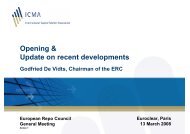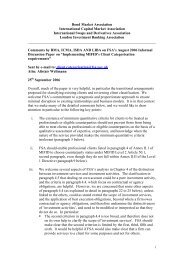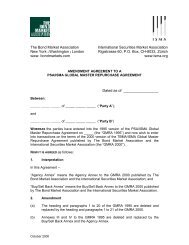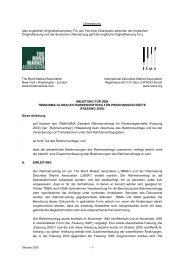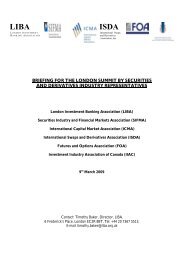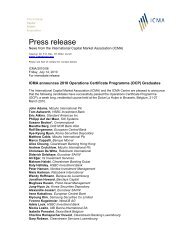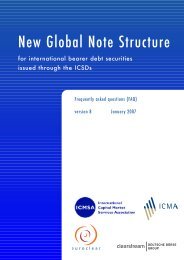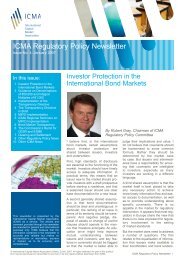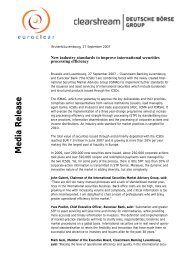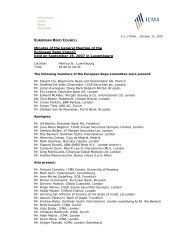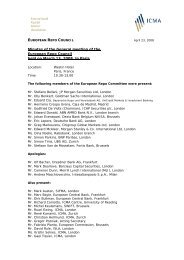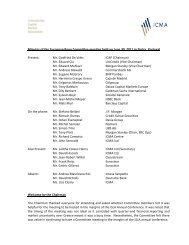Issue no. 22: ICMA Regulatory Policy Newsletter
Issue no. 22: ICMA Regulatory Policy Newsletter
Issue no. 22: ICMA Regulatory Policy Newsletter
You also want an ePaper? Increase the reach of your titles
YUMPU automatically turns print PDFs into web optimized ePapers that Google loves.
As described in its 6 July press release, the Basel Committee<br />
on Banking Supervision (BCBS) issued a progress report on<br />
resolution policies and frameworks. The key findings of the<br />
report are:<br />
• progress has been made in many jurisdictions with the<br />
adoption of special administrative resolution regimes<br />
aimed at the maintenance of financial stability and the<br />
protection of depositors. A critical feature of these regimes<br />
is to transfer part or all of a failing bank’s assets, liabilities<br />
and financial contracts to a bridge bank;<br />
• some jurisdictions continue to lack these and other<br />
important legal powers set out in the BCBS’s 2010<br />
recommendations or continue to rely on general corporate<br />
insolvency procedures. Such procedures are too slow, too<br />
costly and come too late to resolve a failing bank in manner<br />
that ensures continuity of its essential financial functions;<br />
• further work is required on cross-border resolution as<br />
complications continue to arise from discrepancies among<br />
national regimes. In particular, these relate to legal powers, the<br />
ranking of depositor and other creditor claims, and the capacity<br />
of national authorities to share information and coordinate<br />
actions with resolution authorities in other jurisdictions;<br />
• the legal, operational and cross-border complexities<br />
underline the crucial importance of effective contingency<br />
planning and the need for actions that reduce unnecessary<br />
complexity and promote resolvability. Some jurisdictions<br />
are working on solutions that involve improved risk<br />
management or reductions of intra-group guarantees;<br />
• national authorities appear to be at different stages of<br />
developing recovery and resolution plans for systemically<br />
important financial institutions. In view of the importance<br />
of these plans for systemic stability, national authorities<br />
will need to move forward quickly in this area; and<br />
• the BCBS’s report stresses the need to accelerate reforms<br />
of domestic resolution regimes and tools and of frameworks<br />
for cross-border enforcement of resolution actions.<br />
Contact: David Hiscock<br />
david.hiscock@icmagroup.org<br />
REGULATORY RESPONSE TO THE CRISIS<br />
European financial<br />
supervision<br />
On 17 May, the European Securities and Markets Authority<br />
(ESMA) publicised the composition of its Securities and<br />
Markets Stakeholder Group, including details of a list of<br />
alternates who will be called upon to fill any vacancy that<br />
arises (<strong>ICMA</strong>’s President, René Karsenti, is one of the<br />
alternates selected to represent financial market participants).<br />
This Group has been set up to help facilitate consultation<br />
with stakeholders in areas relevant to the tasks of ESMA.<br />
The Group will be consulted on actions concerning regulatory<br />
technical standards and implementing technical standards.<br />
The Group, which will meet at least four times per year, is<br />
made up of 30 stakeholders from various areas, of which<br />
a minimum of 5 representatives are retail investors and 5<br />
academics. A call for expression of interest, which provides<br />
further details on the role and composition of the Panel, was<br />
published by CESR on 26 November.<br />
The European Banking Authority (EBA) an<strong>no</strong>unced the<br />
composition of its Banking Stakeholder Group on 18<br />
March; and the European Insurance and Occupational<br />
Pensions Authority (EIOPA) an<strong>no</strong>unced the members of its<br />
two stakeholder groups, the Insurance and Reinsurance<br />
Stakeholder Group as well as the Occupational Pensions<br />
Stakeholder Group, on 8 March.<br />
The General Board of the European Systemic Risk Board<br />
(ESRB) held its second regular meeting on <strong>22</strong> June. It had a<br />
thorough review of the systemic risks to which the financial<br />
system of the European Union (EU) is exposed. It concurred<br />
that the most serious threat to financial stability in the<br />
EU stems from the interplay between the vulnerabilities<br />
of public finances in certain EU Member States and the<br />
banking system, with potential contagion effects across<br />
the EU and beyond. The General Board also elected Jens<br />
Weidmann, President of the Deutsche Bundesbank, as<br />
member of the Steering Committee, to replace Axel Weber;<br />
and supported the <strong>no</strong>mination of Francesco Mazzaferro,<br />
who was performing this function on an acting basis, as<br />
Head of the ESRB Secretariat.<br />
On 21 June there was also the first meeting of the ESRB’s<br />
Advisory Scientific Committee (ASC), under the chairmanship<br />
of Professor Martin Hellwig. The ASC discussed its own work<br />
programme for 2011 and also identified priorities. It will work<br />
on a wide set of issues, ranging from research topics on<br />
systemic risks to more policy-oriented questions, in support<br />
of the ESRB activities.<br />
<strong>ICMA</strong> <strong>Regulatory</strong> <strong>Policy</strong> <strong>Newsletter</strong> Third Quarter 2011 | 11




